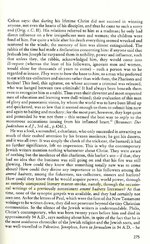Swammerdami
Squadron Leader
Jesus (or Joshua) and James (or Jacob) are very common Jewish names, and there are quite a few people named Jesus mentioned in the works of Josephus.
First: Jesus and Joshua (or more precisely their Hebrew equivalents) are NOT the same name. They ARE etymological cousins, much as John and Jonathon are. But Jesuses went by 'Jesus' and Joshuas went by 'Joshua.'
I don't want to get personal but this fictional meme that Jesus and Joshua are the same name (just to expand the set of Jesuses being "amalgamized"?) does NOT do credit to the mythicists arguing here!
Second: Have the mythicists/amalgamists arguing here actually shown us a list of these other Jesuses? I'm not going to do all your work for you, but I recall one Jesus (NOT executed IIRC) sometimes conflated with the Nazarene who thrived nearly a century before the alleged Nazarene, and perhaps one insurrectionist decades later. There are a small number of 1st-century Jesuses mentioned in histories but who were not insurrectionists and not executed.
Thus, this idea that there were lots of Jesuses wandering about easy to conflate with each other may itself be a ... myth!
The entire and complete discussion of the non-theological history of Jesus is simple:
Might have existed. Doesn’t matter in any way whether he did or not. We will never know anyway.
I think there are many people who, while not believing in a supernatural Jesus, are impressed by the devotion he inspired and therefore curious about the real man.
I'm not one of those. I just like a very wide array of puzzles. Word puzzles, math puzzles, logic puzzles; some people call me a "puzzler."
There are LOTS of interesting historical puzzles. Why was Stonehenge erected? What was the source of the Arthur of Camelot myths? Who wrote the works attributed to William Shakespeare? Answering none of these questions will affect my life, let alone my spiritual life. I just like puzzles.
As I explore some historical or scientific puzzles, I am often especially intrigued by the obstinacy of some who consider themselves experts. As just one example, there is strong evidence that the Black Death in England (1347-1350) was a DOUBLE whammy: Many English died from bubonic plague, but many died from anthrax. Yet I see that the Wikipedia article on the Black Death has zero mention of anthrax.
How about you, bilby? Do you like puzzles? Do you have an opinion on the Christian vs Chrestian sub-debate?



